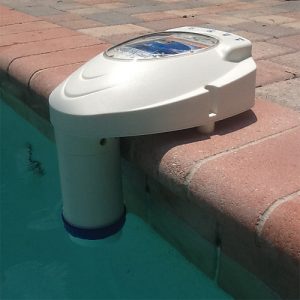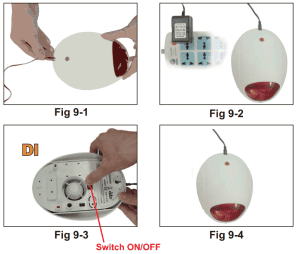A pool alarm enhances your home’s safety by providing real-time alerts when there are disturbances in the water, considerably reducing the risk of accidental drownings, especially for children and pets. These alarms use sensors to detect waves, pressure changes, or breaches in the designated pool area. By notifying you through sound or smartphone alerts, pool alarms guarantee immediate action can be taken to prevent accidents. They’re an essential part of a thorough pool safety plan, complementing barriers like fences and covers, and can often result in insurance discounts. Learn about their effective installation and maintenance for peak safety.
Key Takeaways
- Immediate Alerts: Pool alarms provide instant notifications of pool disturbances, ensuring quick response to potential drowning incidents.
- Enhanced Supervision: They support constant supervision by alerting guardians of unsupervised pool access by children or pets.
- Accident Prevention: Pool alarms significantly reduce the risk of accidental drownings by detecting unauthorized access or unexpected water disturbances.
- Legal Compliance: Installing pool alarms helps comply with safety regulations and can lead to homeowner’s insurance discounts.
Importance of Pool Safety
 Guaranteeing pool safety is crucial to prevent accidents and protect your loved ones. Drowning prevention should be a top priority, as it’s one of the leading causes of accidental death, especially among young children. Implementing effective measures can drastically reduce the risk.
Guaranteeing pool safety is crucial to prevent accidents and protect your loved ones. Drowning prevention should be a top priority, as it’s one of the leading causes of accidental death, especially among young children. Implementing effective measures can drastically reduce the risk.
One of the most critical steps is constant child supervision. Never leave children unattended near a pool, even for a moment. It only takes seconds for an accident to occur.
Establishing clear rules around the pool area is also essential. Make sure children understand the significance of not running, pushing, or playing rough near the water. Additionally, having appropriate barriers, like fences with self-latching gates, can provide an extra layer of security. These barriers should be at least four feet high and difficult for children to climb.
Educating yourself and your family on basic water safety practices would be best. Teach children how to swim at an early age and guarantee they understand the dangers of water.
Enrolling in CPR and first aid courses is equally essential. Being prepared to respond effectively in an emergency can save lives.
How Pool Alarms Work
In addition to these safety measures, a pool alarm provides an added layer of protection by alerting you immediately if someone enters the water unexpectedly. Pool alarm technology uses sensors to detect disturbances in the water, such as waves or pressure changes. These sensors then trigger an alarm, notifying you instantly.
Pool alarms employ various sensors designed to meet different safety regulations and needs. For example, some alarms use surface wave sensors, while others use subsurface sensors to detect changes in water pressure. These alarms are essential for promptly addressing unauthorized or accidental entry into your pool.
| Sensor Type | How It Works |
|---|---|
| Surface Wave | Detects surface waves caused by entry |
| Subsurface Pressure | Measures change in water pressure |
| Infrared Beam | Monitors an invisible beam around the pool |
| Wearable Sensor | Activates when submerged in water |
| Poolside Alarm | Senses movement around the pool area |
Understanding how these systems function helps you appreciate their importance. By incorporating pool alarm technology, you adhere to stringent safety regulations and greatly enhance the security of your home environment.
Types of Pool Alarms
 You’ll encounter options like perimeter fences and surface wave alarms when considering pool alarms. Perimeter fence alarms secure the area around your pool by sounding an alert if someone breaches the boundary.
You’ll encounter options like perimeter fences and surface wave alarms when considering pool alarms. Perimeter fence alarms secure the area around your pool by sounding an alert if someone breaches the boundary.
On the other hand, surface wave alarms detect disturbances on the water’s surface. Understanding these types will help you choose the best system to enhance your home safety.
Perimeter Fence Alarms
Perimeter fence door alarms provide an added layer of security by alerting you whenever someone attempts to access the pool area. These alarms are essential for maintaining fence security because they integrate with your existing pool fence. They typically activate whenever the fence gate is opened without authorization, guaranteeing you’re immediately aware of potential intrusions.
To help you understand better, here’s a comparison of key features of perimeter fence alarms:
| Feature | Description |
|---|---|
| Installation | Easy to install on most fences, providing a seamless addition to your current setup. |
| Sensitivity Levels | Adjustable sensitivity to prevent false alarms, guaranteeing it only activates when there’s a genuine breach. |
| Battery Life | Long-lasting battery life, often with a low battery indicator, guarantees continuous protection without frequent replacements. |
| Alarm Volume | Loud alarm sound, typically around 100 decibels, to guarantee you hear it even from inside the house. |
| Remote Monitoring | Some models offer remote monitoring, allowing you to receive alerts directly on your smartphone or other devices for immediate action. |
Surface Wave Alarms
 Surface wave alarms add an essential layer of safety by detecting disturbances on the water’s surface. They alert you to any unexpected activity in the pool. This type of alarm uses surface wave technology to sense even minor movements, guaranteeing high alarm effectiveness.
Surface wave alarms add an essential layer of safety by detecting disturbances on the water’s surface. They alert you to any unexpected activity in the pool. This type of alarm uses surface wave technology to sense even minor movements, guaranteeing high alarm effectiveness.
When choosing a surface wave alarm, consider the following features for peak performance:
- Sensitivity Adjustments: Many surface wave alarms allow you to adjust their sensitivity. This feature helps you fine-tune the device to avoid false alarms from wind or small animals while still detecting significant disturbances.
- Ease of Installation: Surface wave alarms are typically easy to install. Most models float on the water’s surface or attach to the pool’s edge, requiring minimal setup time and effort.
- Battery Life: Look for alarms with long-lasting batteries or easy recharge options. A reliable power source guarantees the alarm remains functional and practical over time.
- Audibility: An effective alarm should have a loud, clear sound that can be heard throughout your home. Some models also offer remote alerts to your phone, providing additional security.
Features to Look For
Consider sensor sensitivity levels and alarm notification methods when choosing a pool alarm. Sensor sensitivity determines how accurately the alarm detects disturbances in the water, which is essential for timely alerts.
Additionally, look at how the alarm notifies you, whether through loud sounds, smartphone alerts, or both, to guarantee you’re promptly informed of any potential danger.
Sensor Sensitivity Levels
To guarantee your pool alarm provides ideal protection, it’s important to consider its sensors’ sensitivity levels. The accuracy of these sensors directly impacts the alarm’s ability to detect disturbances in the water, which can vary based on the size and activity of the object entering the pool.
Here are four significant features to reflect on:
- Sensor Calibration: Proper sensor calibration guarantees an accurate response to specific water disturbances. Look for alarms that allow you to adjust this calibration to suit your pool’s unique environment.
- Adjustable Sensitivity Settings: Not all pools are the same, and different conditions may require different sensitivity levels. Opt for alarms that offer adjustable settings, letting you tailor the sensitivity to avoid false alarms from small animals or debris.
- Detection Range: The range within which the sensor can detect movement is crucial. Confirm that the alarm covers the entire pool area, including corners, to maximize safety.
- Response Time: The speed at which the sensor detects a disturbance and triggers the alarm is essential. Quick response times can significantly reduce accidents.
Alarm Notification Methods
 After guaranteeing your pool alarm’s sensors are finely tuned, you should focus on how the alarm will notify you of any detected disturbances. Alarm technology advancements have greatly improved the ways these devices can alert you. Traditional alarms might rely solely on loud sirens, which can be effective but may not always be sufficient, especially if you’re indoors or away from home.
After guaranteeing your pool alarm’s sensors are finely tuned, you should focus on how the alarm will notify you of any detected disturbances. Alarm technology advancements have greatly improved the ways these devices can alert you. Traditional alarms might rely solely on loud sirens, which can be effective but may not always be sufficient, especially if you’re indoors or away from home.
Consider your notification system preferences. Many modern pool alarms offer multiple notification methods to enhance safety. Look for models that use audible alarms and visual indicators, such as flashing lights, to catch your attention quickly. Some advanced systems can send notifications directly to your smartphone or other connected devices through dedicated apps. This feature guarantees you’re alerted immediately, no matter where you are.
Wireless connectivity is another significant advancement. Some pool alarms can integrate with your home security system, providing a unified approach to safety. Opt for alarms with customizable settings, allowing you to adjust the volume, tone, and type of alert to suit your needs. Focusing on these features guarantees that your pool alarm delivers timely and effective notifications, enhancing your home’s safety.
Installation Process
Installing a pool alarm is a straightforward process that greatly enhances your home’s safety. Whether you opt for a professional or DIY installation, understanding the steps involved is essential for guaranteeing peak performance. Here’s a simple guide to help you through the installation process:
- Choose the Right Alarm System: Research different types of pool alarms to find one that fits your needs. Options include surface wave detection alarms, subsurface detection alarms, and wearable alarms.
- Placement and Positioning: Determine the best location for the alarm. This usually means attaching the unit to the pool’s edge for surface and subsurface alarms. Make sure it’s positioned where it can detect any disturbances effectively.
- Mounting the Device: Follow the manufacturer’s instructions for mounting. This may involve using brackets or adhesive pads. Professional installation often guarantees that the alarm is securely and correctly mounted, but DIY installation can be just as effective if instructions are followed carefully.
- Testing the Alarm: Once installed, test the alarm to confirm it’s working correctly. This involves simulating pool entry to check the responsiveness. Regular testing is recommended to maintain reliability.
Benefits of Pool Alarms
 Enhancing your home’s safety with a pool alarm provides peace of mind by reducing the risk of accidental drownings.
Enhancing your home’s safety with a pool alarm provides peace of mind by reducing the risk of accidental drownings.
Pool alarms serve as an essential layer of protection, alerting you immediately when someone enters the pool area, which is particularly vital if you have young children or pets. By investing in a pool alarm, you significantly increase the safety of your household.
From a cost considerations perspective, pool alarms are relatively affordable and can be a cost-effective safety measure compared to the potential expenses associated with a drowning incident. The initial investment in a pool alarm can save you from the heartache and financial burden of accidents. Additionally, many insurance companies may offer homeowner insurance discounts if you install a pool alarm, further offsetting costs.
Legal requirements also play a significant role in installing a pool alarm. In several jurisdictions, pool alarms are mandated by law as part of residential pool safety regulations. Compliance with these legal requirements guarantees you avoid penalties and reinforces the importance of maintaining a safe environment.
Installing a pool alarm addresses safety and regulatory needs, making it a prudent choice for any pool owner.
Common Misconceptions
Despite their proven benefits, many people still hold misconceptions about the effectiveness and necessity of pool alarms. Addressing these pool safety myths can help you make informed decisions for your home.
- Pool alarms are unnecessary if you can swim well. This is a shared pool safety myth. Even strong swimmers can face emergencies. Unexpected falls, medical issues, or panic can turn a routine swim into a dangerous situation. A pool alarm offers an extra layer of protection.
- Alarms are always going off for no reason. Alarm effectiveness misconceptions often include the belief that alarms trigger falsely. While some lower-quality models may have such issues, reputable alarms are designed to minimize false alarms, ensuring they activate only when necessary.
- They’re too expensive for what they offer. Many people think pool alarms are an unnecessary luxury. However, a reliable alarm costs minimal compared to the potential expense of accidents or legal liabilities. It’s a small price for peace of mind.
- Fences or covers are enough. While physical barriers are essential, they aren’t foolproof. Children can find ways past them, and covers can be left off. Alarms provide an additional safeguard, alerting you immediately to any breaches.
Maintenance Tips
 Regular maintenance guarantees your pool alarm remains in peak working condition, safeguarding your home effectively. To keep your pool alarm operational, incorporate routine checks into your pool cleaning schedule. A well-maintained alarm can promptly alert you to potential danger, providing peace of mind.
Regular maintenance guarantees your pool alarm remains in peak working condition, safeguarding your home effectively. To keep your pool alarm operational, incorporate routine checks into your pool cleaning schedule. A well-maintained alarm can promptly alert you to potential danger, providing peace of mind.
Firstly, verify the alarm’s sensors are free from debris. Leaves, dirt, and other particles can interfere with the device’s functionality. Clean the sensors gently using a soft cloth. Additionally, regularly test the alarm to confirm it’s working correctly. Most manufacturers recommend monthly testing; follow their guidelines closely.
Proper water chemistry is also essential. Imbalanced water can damage electronic components over time. Regularly monitor and adjust the pool’s pH, chlorine, and alkalinity levels. This ensures the water remains safe for swimming and doesn’t affect the alarm.
Here’s a quick checklist to help you stay on top of maintenance:
| Task | Frequency |
|---|---|
| Clean sensors | Weekly |
| Test alarm | Monthly |
| Check battery life | Quarterly |
| Inspect wiring | Biannually |
| Balance water chemistry | Weekly |
Making the Right Choice
Choosing the right pool alarm involves considering various features that match your safety needs. Start by understanding the different pool alarm types that are available.
Surface wave alarms detect waves on the pool’s surface, while subsurface alarms monitor underwater disturbances. Personal immersion alarms are wearable devices that alert you when someone enters the water. Finally, gate alarms activate when someone opens the pool gate.
When evaluating alarms, consider these key factors:
- Type of Alarm: Choose between surface wave, subsurface, personal immersion, or gate alarms based on your pool configuration and primary concerns.
- Sensitivity and Range: Verify that the alarm can detect small disturbances and effectively covers the entire pool area.
- Ease of Use: Use user-friendly models with straightforward installation and operation instructions.
- Alarm System Integration: Check if the pool alarm can integrate with your existing home security system for centralized monitoring and increased safety.



